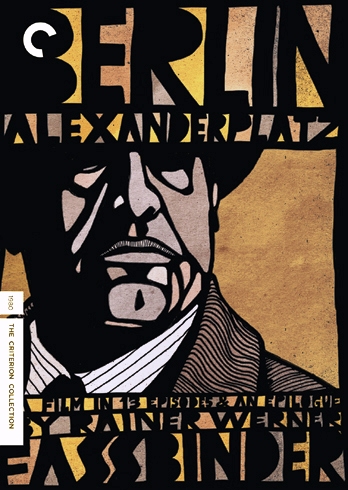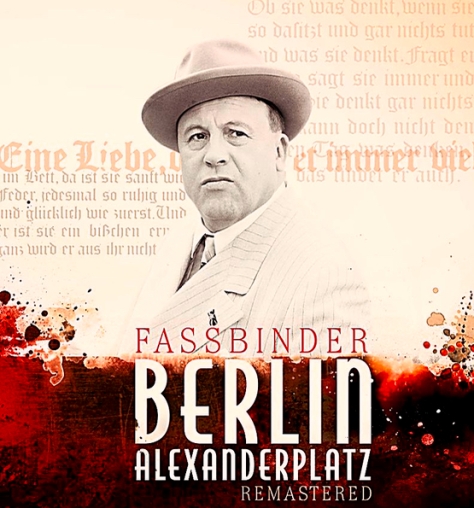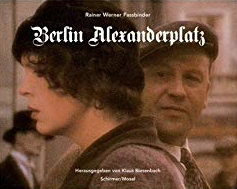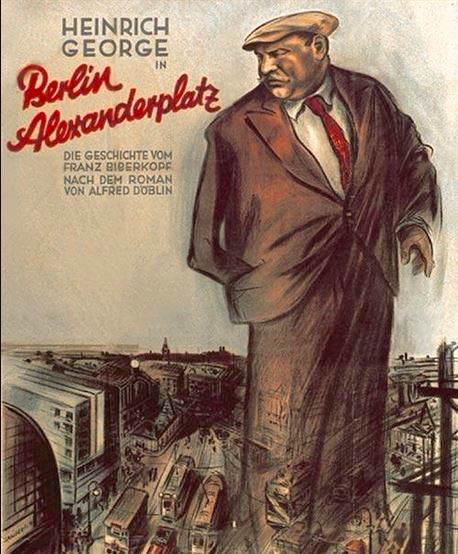Susan Sontag wrote that Rainer Marie Fassbinder’s (1980) 942-minute adaptation of Alfred Döblin’s novel of the same name is the only great movie based on a great novel. Döblin’s (1929) novel is written in such thick 1920’s Berlin lower-class slang as to be inaccessible even to native speakers of German (and to be “untranslatable”), though it is touted (not just by Sontag) as The Great German Modernist Novel. Perhaps the novel is, but unlike Sontag and others who survived the ordeal of watching it, I don’t think that — even if it is a movie rather than a miniseries — Fassbinder’s “Berlin Alexanderplatz” is a great movie.

It is a very Fassbinder movie in making few concessions to viewers. The picture is often dark, there is the usual Fassbinder mix of nasty exploitative characters and brutish innocents, augmented by an angelic innocent who is, of course, murdered. Fassbinder thought of playing the main character, Franz Biberkopf, himself. In fact, he had already cast himself as a character with that name, the brutish lottery winner who is ruthlessly exploited by an aristocratic lover in need of money in “Faustrecht der Freiheit ” (Fox and His Friends, 1975). “Franz” was also a name given to characters in many other Fassbinder plays and films.
Döblin’s original Franz Biberkopf (played by a bulked-up Günter Lamprecht) is coming out of prison, where he has completed a four year sentence for beating his girlfriend to death. He wants to go straight — but this proves to be impossible (haven’t we seen that somewhere before? many times?). Franz has the archetype of a false friend in the stuttering Reinhold (Gottfried John), who passes his female conquests on to Franz when he tires of them, gets Franz involved in a burglary, botches trying to get Franz killed during the escape (though Franz loses an arm), and murders the discard whom Franz will no relinquish when Reinhold is ready to pass on another one.

Shot (full-frame) on the set left from Ingmar Bergman’s disastrous “The Serpent’s Egg” (the real Berlin Alexanderplatz was mostly destroyed during the Second World War and was in East Berlin, besides), it seems that about 12 hours of the anti-epic are shot in Franz’s room (the very one in which he beat the woman to death, which is reprised in recurrent flashbacks). IMO most everything in the film with the exception of Barbara Sukowa is ugly.

The travails of a working-class antihero who is unable to see that his friend is a devil are followed by a phantasmagoric epilogue. Apparently the book also has one, though I doubt that it could be as Fassbinderish in his stylized outrageousness mode as the movie is. It, too, goes on seemingly forever.
And, being a Criterion edition, there’s another disc and a half of bonus features. I found the two “making of” ones more interesting than the movie itself. Plus there is a 1931 screen adaptation (not, alas, remastered and not in good shape). Phil Jutzi reduced the book to an hour and a half movie that is not so sour as Fassbinder’s rendering and with a Franz less aware of suffering (more a bumbling idiot, less a Teutonic Job).

Call me superficial, but I thought that Jutzi’s version was more enjoyable. Fassbinder’s is so slow that I periodically had to speed it up. I’ll grant that Fassbinder (and audiences of his enti-epic) know what was ahead for Berlin and Germany, whereas Döblin and Jutzi saw the collapsing Weimar Republic. (There are Nazis in the movie; one of Franz’s many jobs other than being a pimp is hawking Nazi papers in the streets of the (studio) Alexanderplatz.)
I would also suggest some long-arced cable-tv series as being more satisfyingly novelistic, and for that matter, the BBC has adapted a number of 19th-century novels (and some 20th-century ones, too) that are not cut down to fit into two hours, so I don’t see Fassbinder’s lengthy adaptation as all that unique.
There is also a 35-minute documentary on the restoration and a 25 minute lecture (that seems longer) by Peter Jelavich.
Sontag argues that Fassbinder did not “serialize” Berlin Alexanderplatz, so cramming the 14 parts into as few viewings as one can bear is better than stretching it out over 14 weeks, as in the original telecasts. Perhaps, somewhere, there is someone masochistic to watch it all in a day?
©2018, Stephen O. Murray